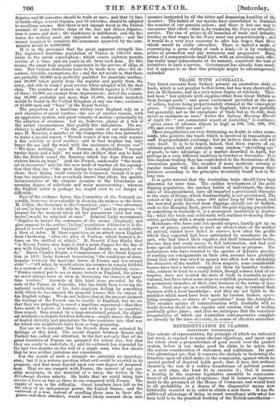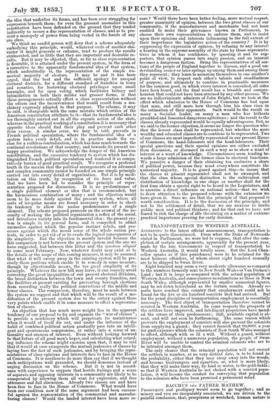REPRESENTATION BY CLASSES.
OBJECTIONS CONSIDERED.
THE scheme of representation, the principle of which we indicated last week, is exposed to many obvious objections, and must upon the whole show a preponderance of good result over the present system before it can make good its claim to be taken into the serious consideration of statesmen and politicians. Its posi- tive advantages are, that it removes the obstacle to bestowing the franchise upon all adult males in the community, against whom no special ground of deprival holds good ; that it does this without ineurrieg the risk of a sudden transference of political powers to a new class, the least fit, to exercise it ; that it secures a hearing in the supreme legislative assembly to representa- tives of all interests and all opinions ; that it insures an improve- ment in the personnel of the House of Commons, and would tend in all probability to a disuse of the disgraceful means now habitually resorted to in order to obtain a seat there. It has the additional advantage of being in exact accordance with what has been held to be the practical working of the 'British constitution-
the idea that underlies its forms, and has been ever struggling for expression beneath them; for even the grossest anomalies in this constitution have been defended on the ground that they tended indirectly to secure a due representation of classes, and so to pre- vent a monopoly of power from being vested in the hands of any one class. We think no candid person will deny that a scheme adequately embodying this principle, would, whatever evils of another cha- racter it might generate or enhance, tend to produce the results enumerated, and as little that they are important and desirable re- sults. But it may be objected, that, so far as class representation is desirable, it is attained under the present system, in the form of a corrective to the apparently fundamental idea of that system, which undoubtedly is, the representation of the simple nu- merical majority of electors. It may be and it has been urged, that the best and the sufficient apology for unequal electoral districts, for a different standard of franchise in town and counties, for bestowing electoral privileges upon small boroughs, and for open voting which facilitates bribery and intimidation in both their milder and grosser forms, is that these arrangements actually effect a class representation without the odium and the inconvenience that would result from a ma- chinery expressly adapted to that purpose. The scheme, it may be said, is chargeable with the same mistake which critics of the American constitution attribute to it—that its fundamental idea is too thoroughly carried out in all the organic action of the state, whereas in the practical working of a constitution it is necessary that opposite ideas should find their play and prevent each other from excess. A similar error, we may be told, prevails in French political speculation, where the fundamental idea of a system rules every detail, and is in practice made the ex- cuse for a ruthless centralization, which has done much towards the continual revolutions of that country, and towards its present un- happy prostration. We acknowledge the danger of the American constitution, and the excessive tendency to system which has dis- tinguished French political speculation and rendered it so compa- ratively barren. of good practical result. We recognize a profound truth in the maxim that the political arrangements of an advanced and complex community cannot be founded on one simple principle carried out into every detail of organization. But it is by medi- tation on this truth, by recognition of its force and value, that we have been. led to consider the principle of repre- sentation proposed for discussion. It is no predominance of a single political element or idea that is recommended, but the harmonious combination of many ; and the objection would seem to lie more fairly against the present system, where all sorts of irregular means are found necessary in order to check its tendency to allow the undue predominance of a single element. The scheme proposed proceeds on the avowal of the ne- cessity of making the political organization a reflex of the social, and introduces variety into its fundamental idea : the present sys- tem is simple in its general form, and is compelled to admit anomalies against which the popular instinct rebels, and pro- cesses against which the moral sense of the whole nation pro- tests, in order to get rid of or to evade the logical consequences of its simplicity. But the objection is mainly invalid because the fair comparison is not between the present system and the one we have suggested, but between this latter and the ignotum aliquid to come next February. Now, whatever doubt may exist as to the details or the scope of this coming measure, it may be assumed that what it will sweep away in the existing system will be pre- cisely those portions which enable it to remedy in some measure, though by objectionable means, the too great simplicity of its principle. Whatever the new bill may leave, it can scarcely avoid correcting the great inequalities of our present electoral divisions, the broad distinction between the town and county franchise, and the facilities at present existing for preventing borough elections from recording really the political convictions of the middle and lower classes. The comparison, therefore, must be made between the system we suggest and that which will be the result of a mo- dification of the present system due to the outcry against those very points which enable it in some measure to effect a representa- tion of classes.
An objection that has much more weight lies in the apparent tendency of our proposal to fix and organize the "war of classes " ; to provide a machinery which will perpetuate its maintenance when it would of itself die out, and under the influence of the habit of combined political action gradually pass into an intelli- gent and spontaneous compromise, or rather into a sense of na- tionality and oneness of interest. Even without looking forward to that future of all good men's hopes, and calculating what retard- ing influence the scheme might exercise upon that, it may be said that it would at once exasperate the mutual jealousies of classes by laying bare the fact of such jealousies, and by bringing the repre- sentatives of class opinions and interests face to face in the House of Commons. It is needless to do more than say that if we thought such anticipations well grounded, we should denounce instead of urging discussion on the scheme. But it is not in accord- ance with experience to suppose that hostile feelings and a sense of separate and opposing interests in a community are likely to be exasperated by allowing them all vent for expression, and free utterance and full discussion. Already two classes are and have been face to face in the House of Commons. What would have been our condition now if the same argument had been success- ful against the representation of the commercial and manufac- turing classes ? Would the landed interest have been more Se- eure ? Would there have been better feeling, more mutual respect, greater unanimity of opinion, between the two great classes of our community, if the manufacturers and merchants had not been enabled to make their grievances known in Parliament, to choose their own representatives to enforce them, and to insist upon their opinions and interests influencing to the full extent. of their importance the legislative action of the country ? It is by suppressing the expression of opinion, by refusing to any interest a hearing in the supreme assembly of the state by those representa- tives in whom it has confidence, by ignoring it and its sup- porters, that opinion passes into angry passion, and an interest becomes a dangerous faction. Bring the representatives of all sec- fleas of the people of England together to discuss, and a good un- derstanding sooner or later springs up among them and among those they represent ; they learn to accustom themselves to one another's point of view, to respect each other's talents and steadfastness of purpose, and ultimately to combine in practicable measures for the common good, in which every interest is consulted, all sides have been heard, and the final result has a breadth and compre- hension that could not have been attained by any other process. We are no indiscriminate admirers of John Bnght, but we look at the effect which admission to the House of Commons has had upon that man, and still more how through him his class rises in the estimation of their opponents. Such would be the result on many a Socialist leader, on many a man who has hitherto grumbled and fomented dangerous agitations ; and the result to the classes already represented would be equally advantageous. But, as we said to the former objection, it seems no longer the question whe- ther the lowest class shall be represented, but whether the more wealthy and educated classes are to continue to be represented. Two of our classes are most imperfectly represented in our present House of Commons, the hand-labourers and the head-labourers. Their special questions and their special opinions are either excluded from discussion, or discussed in such a way as to show a want of interest or a want of knowledge. Circumstances seem tending to- wards a large admission of the former class to electoral functions. We perceive a danger of their obtaining too exclusive a share of political power, because they must everywhere constitute the numerical majority. It is to guard against this—to insure that the classes at present represented shall not be swamped, and that -the class whose special distinction is the cultivation and distribution of knowledge in one shape or another shall for the first time obtain a special right to be heard in the Legislature, and to exercise a direct influence on national action—that we wish to draw attention to the proposed scheme with the extension we have given it. Sure we are that the principle of that proposal is worth consideration. It is to the discussion of the principle, and not to the settlement of detail, that we are anxious to invite public men and political thinkers ; and for that end we have not feared to risk the charge of idle theorizing on a matter of extreme practical importance pressing for early decision.



































 Previous page
Previous page